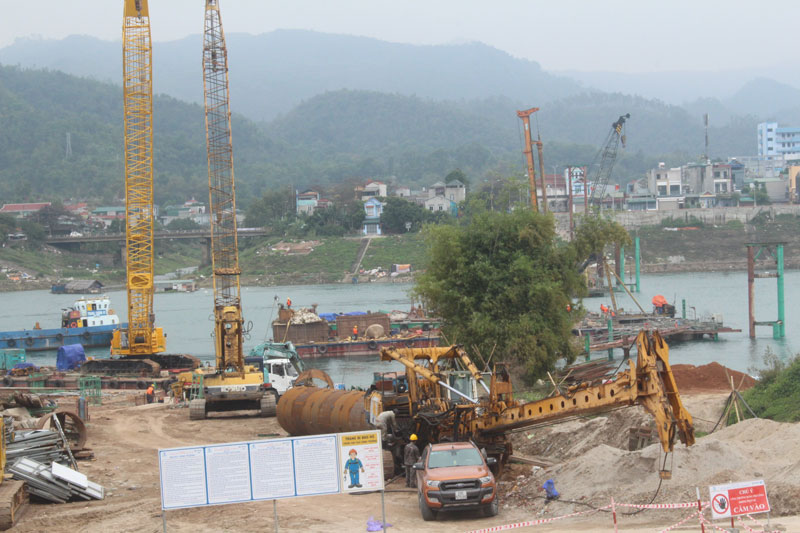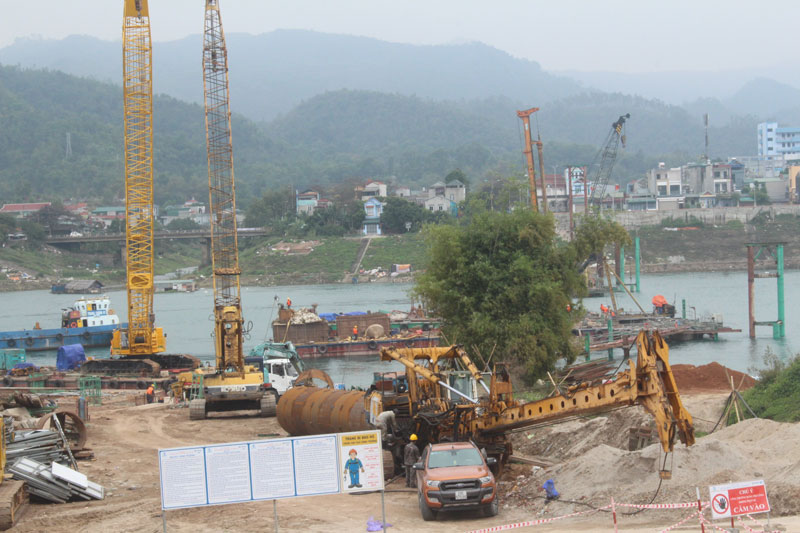
(HBO) - Hoa Binh province views investment capital as the key to completing local socio-economic infrastructure. Therefore, aside from effectively using the capital sourced from the state budget, it has mobilised funding from businesses, people, as well as domestic and foreign organisations.
 Construction
of Hoa Binh 2 Bridge is being accelerated. Once put into use, the facility will
help complete transport infrastructure of Hoa Binh city.
Construction
of Hoa Binh 2 Bridge is being accelerated. Once put into use, the facility will
help complete transport infrastructure of Hoa Binh city.
The total investment capital raised from society
over the last five years is estimated at 80.2 trillion VND (3.4 billion USD),
including 10.73 trillion VND of public investment capital spent on developing
transport facilities, industrial parks, urban infrastructure, power supply,
water supply and drainage, education, health care, tourism, and production and
business development.
Under the motto of "transport must be developed
first to pave the way”, between 2016 and 2020, many key transport lines have
been built and upgraded, thus creating an important driving force for local
socio-economic development and attracting investment to the province. Prominent
among them are Hoa Lac – Hoa Binh Road, the Xuan Mai – Hoa Binh section of
National Highway 6, the first 23km of Provincial Road 433, Provincial Road 435,
the inter-district road in mountainous Lac Son and Tan Lac districts, Hoa Binh
3 Bridge, Hoa Binh 2 Bridge, and Trang Bridge. The province is also speeding up
investment in the road linking National Highway 6 with Chi Lang Road, and Hoa
Binh – Moc Chau Expressway under the public-private partnership format.
So far, Hoa Binh province has had 10,446km of
roads, a majority of which have been asphalted or concretised, increasing by
about 1,442km from 2015. Apart from national highways and provincial and
district roads, 78 percent of communal roads in the province have been
concretised or asphalted, the rate of such roads in urban areas is 91 percent,
specialised roads 76 percent, and inter-hamlet roads 61 percent.
Over the last five years, nearly 400 irrigation
works have been upgraded, and more than 250km of canals reinforced as a result
of the greater attention paid to improving essential infrastructure facilities
in rural and disadvantaged areas. Aside from calling for investment to water
supply facilities, information technology, urban areas, and healthcare and
educational establishments, Hoa Binh has also carried out many power supply
infrastructure projects to serve people’s daily life and production demand.
Across the province, 19 traditional markets, one
trade centre and one supermarket have been built and upgraded, and seven
traditional markets renovated, bringing the total number of traditional market
to 93, supermarkets to five and trade centres to three. The development of
trade infrastructure has not only helped improve local living standards, meet
people’s consumption and trading demand, but also encouraged residents,
especially in rural areas, to boost mass production./.
According to data from the Hoa Binh Provincial Party Committee, the industrial production index for the first six months of 2025 is estimated to have increased by 20% compared to the same period last year. This marks the highest year-on-year growth rate for this period since 2020.
In the first six months of 2025, Hoa Binh province’s export turnover was estimated at 1.145 billion USD, marking an 18.11% increase compared to the same period in 2024. Import turnover was estimated at $ 804 million, a 17.15% increase, which helped the province maintain a positive trade balance.
The lives of the ethnic minority farmers in Tan Lac district have gradually improved thanks to the new directions in agricultural production. This is a testament to the collective strength fostered through the professional associations and groups implemented by various levels of the district’s Farmers’ Union.
With the motto the "product quality comes first,” after nearly one year of establishment and operation, Muong village’s Clean Food Agricultural and Commercial Cooperative, located in Cau Hamlet, Hung Son Commune (Kim Boi district), has launched reputable, high-quality agricultural products to the market that are well-received by consumers. The products such as Muong village’s pork sausage, salt-cured chicken, and salt-cured pork hocks have gradually carved out a place in the market and they are on the path to obtaining the OCOP certification.
In the past, the phrase "bumper harvest, rock-bottom prices" was a familiar refrain for Vietnamese farmers engaged in fragmented, small-scale agriculture. But today, a new spirit is emerging across rural areas of Hoa Binh province - one of collaboration, organisation, and collective economic models that provide a stable foundation for production.
Maintaining growing area codes and packing facility codes in accordance with regulations is a mandatory requirement for agricultural products to be eligible for export. Recently, the Department of Agriculture and Environment of Hoa Binh province has intensified technical supervision of designated farming areas and packing facilities to safeguard the "green passport" that enables its products to access international markets.



 Construction
of Hoa Binh 2 Bridge is being accelerated. Once put into use, the facility will
help complete transport infrastructure of Hoa Binh city.
Construction
of Hoa Binh 2 Bridge is being accelerated. Once put into use, the facility will
help complete transport infrastructure of Hoa Binh city.